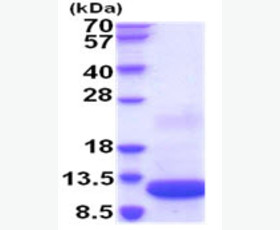Recombinant Human Neuritin/NRN1
| Product name: | Recombinant Human Neuritin/NRN1 |
| Source: | E. coli |
| Purity: | Greater than 95% as determined by reducing SDS-PAGE. |
| Buffer Formulation: | Lyophilized from a 0.2 μm filtered solution of 20mM Tris,150mM NaCl,pH 8.0. |
| Applications: | Applications:SDS-PAGE; WB; ELISA; IP. |
| Storage: | Avoid repeated freeze/thaw cycles. Store at 2-8 oC for one month. Aliquot and store at -80 oC for 12 months. |
| UOM: | 100ug/50ug/200ug/1mg/1g |
| Source | E. coli |
| Description | Recombinant Human Neuritin is produced by our E.coli expression system and the target gene encoding Ala28-Gly116 is expressed with a 6His tag at the N-terminus. |
| Names | Neuritin,NRN1,NRN |
| Accession # | Q9NPD7 |
| Formulation | Lyophilized from a 0.2 μm filtered solution of 20mM Tris,150mM NaCl,pH 8.0. |
| Shipping |
The product is shipped at ambient temperature. |
| Reconstitution |
Always centrifuge tubes before opening. Do not mix by vortex or pipetting. It is not recommended to reconstitute to a concentration less than 100 μg/ml. Dissolve the lyophilized protein in ddH2O. Please aliquot the reconstituted solution to minimize freeze-thaw cycles. |
| Storage |
Lyophilized protein should be stored at < -20°C, though stable at room temperature for 3 weeks. Reconstituted protein solution can be stored at 4-7°C for 2-7 days. Aliquots of reconstituted samples are stable at < -20°C for 3 months. |
| Purity |
Greater than 95% as determined by reducing SDS-PAGE. |
| Endotoxin | Less than 0.1 ng/µg (1 IEU/µg) as determined by LAL test. |
| Amino Acid Sequence |
MGSSHHHHHHSSGLVPRGSHMAGKCDAVFKGFSDCLLKLGDSMANYPQGLDDKTNIKTVCTYWED FHSCTVTALTDCQEGAKDMWDKLRKESKNLNIQGSLFELCGSGNG
|
| Background | Neuritin/NRN1 is a member of the neuritin family and can be expressed in postmitotic-differentiating neurons of the developmental nervous system and neuronal structures associated with plasticity in the adult. Neuritin/NRN1 promotes neurite outgrowt, arborization and neuritogenesis. The protein contains a consensus cleavage signal found in glycosylphoshatidylinositol (GPI)-anchored proteins.Overexpression of the encoded protein may be associated with astrocytoma progression. |














